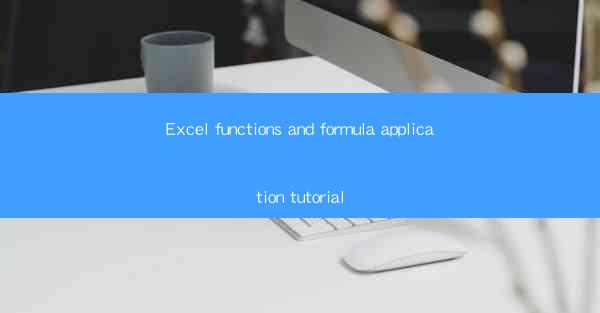
Unlocking the Power of Excel: A Journey into the World of Functions and Formulas
Are you tired of tediously crunching numbers in Excel? Do you wish you could harness the true power of this versatile tool? Prepare to embark on an exhilarating tutorial that will transform you from an Excel user into an Excel wizard! In this article, we will delve deep into the world of Excel functions and formulas, uncovering the secrets that will make your data analysis a breeze.
Why Excel Functions and Formulas Matter
Excel is not just a spreadsheet; it's a powerful tool that can revolutionize the way you work with data. Functions and formulas are the backbone of Excel's capabilities, allowing you to perform complex calculations, automate tasks, and uncover hidden insights. Whether you're a student, a professional, or a data enthusiast, mastering these tools will elevate your Excel skills to new heights.
The Basics: Understanding Functions
Functions are pre-defined formulas that perform specific calculations. They are designed to simplify complex tasks and save you time. In Excel, there are over 400 functions, each serving a unique purpose. Let's explore some of the most commonly used functions:
- Sum: Calculates the total of a range of values.
- Average: Computes the average value of a range.
- Count: Counts the number of cells that contain numbers.
- Max and Min: Determines the highest and lowest values in a range.
By incorporating these functions into your spreadsheets, you can quickly perform calculations that would otherwise take hours.
Mastering Formulas: The Art of Calculation
While functions are powerful, formulas take Excel to the next level. Formulas are combinations of functions, constants, and cell references that perform calculations. They allow you to manipulate data, create dynamic charts, and automate repetitive tasks. Here's a simple formula structure:
```
=FUNCTION(Argument1, Argument2, ...)
```
For example, the formula `=SUM(A1:A10)` would calculate the sum of values in cells A1 through A10.
Advanced Techniques: Beyond the Basics
Once you've mastered the basics, it's time to dive into more advanced techniques. Here are a few tips to help you take your Excel skills to the next level:
- Array Formulas: These powerful formulas allow you to perform calculations on entire ranges of data at once.
- Logical Functions: Functions like `IF`, `AND`, and `OR` enable you to make decisions based on conditions.
- Text Functions: Functions like `CONCATENATE`, `LEFT`, and `RIGHT` help you manipulate text data.
By incorporating these advanced techniques, you can create sophisticated models and automate complex tasks with ease.
Practical Examples: Real-World Applications
To truly understand the power of Excel functions and formulas, let's explore some practical examples:
- Financial Modeling: Use functions like `PV`, `FV`, and `NPER` to calculate loan payments, future values, and periods.
- Data Analysis: Utilize functions like `VLOOKUP`, `HLOOKUP`, and `INDEX/MATCH` to analyze large datasets and extract valuable insights.
- Project Management: Create dynamic Gantt charts using functions like `SUMIF`, `COUNTIF`, and `DATE`.
These examples demonstrate the versatility of Excel functions and formulas in various real-world scenarios.
Conclusion: Your Path to Excel Mastery
By now, you should have a solid understanding of Excel functions and formulas. From the basics to advanced techniques, this tutorial has equipped you with the knowledge to unlock the true potential of Excel. Remember, the key to mastering Excel lies in practice and experimentation. Keep exploring, keep learning, and soon you'll be creating powerful spreadsheets that will amaze your colleagues and friends.
So, what are you waiting for? Dive into the world of Excel functions and formulas, and transform your data analysis skills forever!











